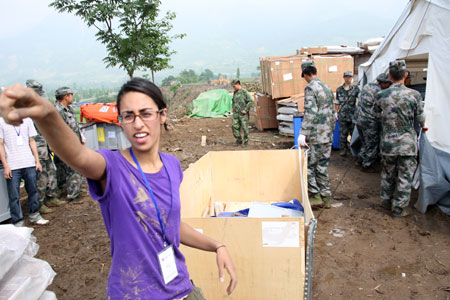ByJohn Sexton
China.org.cn correspondent reporting from Sichuan
Additional reporting by Keen Zhang

Zahra Ali of the British Red Cross directs PLA troops who are helping set up the Red Cross base camp in Jiulong town. NGO team leaders told China.org.cn that cooperation with the authorities has been excellent.
One month after the May 12 earthquake, China.org.cn visited Jiulong, a township in Mianzhu, Sichuan, and found, amid appalling devastation and tragedy, people pulling together to rebuild their communities with massive assistance from government, NGOs, and individual volunteers.
Jiulong is the main township administering forty or so small farming communities scattered across flat rice-growing land at the foot of the Longmen mountains; it is just 30 kilometers from the earthquake epicenter Wenchuan.
The town was almost completely leveled, and hundreds of its residents killed, on May 12. Only a few, mainly modern buildings are still standing; almost all the older houses crumbled into piles of bricks. Many survivors are living in tents near to, or sometimes within, the wreckage of their former homes, unwilling to leave their personal belongings, or maybe from a personal sense of belonging.
Jiulong exemplifies many familiar aspects of the Sichuan earthquake story. There was a horrific school collapse in which at least 150 primary school children were killed. The ruins of the school, with dozens of large white wreaths, and small table-shrines carrying children's toys, are a shocking and harrowing sight. Parents have hung banners proclaiming the collapse of the building was not a natural disaster but a man-made tragedy caused by shoddy construction. The authorities, for their part, have not attempted to remove the banners.
Our experience in Jiulong reflected the halting and contradictory steps, seen since May 12, towards greater media openness. When we arrived at Jiulong, in convoy with the International Red Cross, we were stopped by police and told "No interviews, no photos." But once inside the town we found a Spanish film crew working openly. One of the leaders of the Red Cross base camp, also from Spain, told us "If you have any problems with interviews and so on, just call me. The police chief is my friend; I have lunch with him every day."
There are cases of terrible hardship. As we toured the town with the International Red Cross, we were stopped by Huang Dexiu, an elderly lady who pleaded with us to help her care for her husband, Fu Qingyou, an 82-year-old PLA veteran, wounded almost 60 years ago in the Korean War.